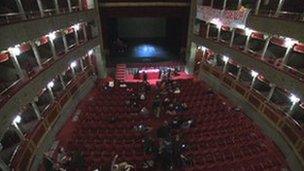Italian theatre occupied: tempers fray in Rome drama
- Published

A young performer walks to an empty seat on a stage, sits down and then starts to deliver her lines with measured intensity.
There is only a small audience, but the setting is special - steeped in centuries of theatrical tradition.
Balconies decorated in red and gold rise up to a ceiling where painted figures look down on the performances below.
This is the Teatro Valle, Rome's oldest theatre. And right now the place itself is playing a central role in its own, very political drama.
For the past five months, the theatre has been occupied in the name of the people.
Constant presence
A 24-year-old actress called Martina remembers the day of the take-over.
"When I arrived I realised that there was something very, very important going on -- like a revolution - a cultural revolution. That's why I'm here."
And like other actors and their supporters, Martina now lives in the theatre. The activists have maintained a constant presence on the premises ever since.
The occupation began amid talk of the possibility of Rome's municipality privatising the theatre, and rumours that it might even be turned into a restaurant.
"The people stepped in and said no," said one of the activists, Andrea Baranes, describing the theatre as a public or common good.
"It's a good for all citizens and we want it to remain one of the jewels of Roman and Italian culture."
Mr Baranes argued that the theatre should not be the municipality's property, that it should belong to the people of the city: they should care for it and decide how it should be managed.
It was put to him that the municipality itself could surely be seen as representing "the people". That they voted for it, and paid taxes to it, and that it acted on their behalf.
But Mr Baranes replied that those occupying the theatre did not feel that Italy's institutions spoke for them - and that they needed to be suspicious of bodies like the city council.
'Illegal and unnecessary'
However, in the municipality's view, the occupation is both illegal and unnecessary and it wants its premises back.
"The theatre belongs to the city, the country and the world," said the city's spokesman, Dino Gasperini.
"So the local administration should have the chance to organise a season there. And there's no doubt that the theatre would remain public," he said.
But the occupation is about more than the fate of the Teatro Valle. It has a much broader political agenda.
The activists see themselves as making a stand against the steady erosion of funding for the arts in Italy.
Mr Baranes said there were many alternatives to the traditional austerity economics that Italy was now being forced to endure.
He argued, for example, that most Italians would rather see cuts to defence spending than to their schools and health care.
The activists draw inspiration from the international movement that has staged occupations on Wall Street, and at many other sites in cities around the world.
And hanging in the air in the old theatre are hopes that what is happening there just might be the beginning of something much larger.
The young actress, Martina, put it like this:
"I hope that there will be something better than now. That there will be a better society, better cities and that Italy will be a better country.
"I know it's hard, and that it won't be easy, but this is my hope."
- Published17 November 2011
- Published28 December 2011